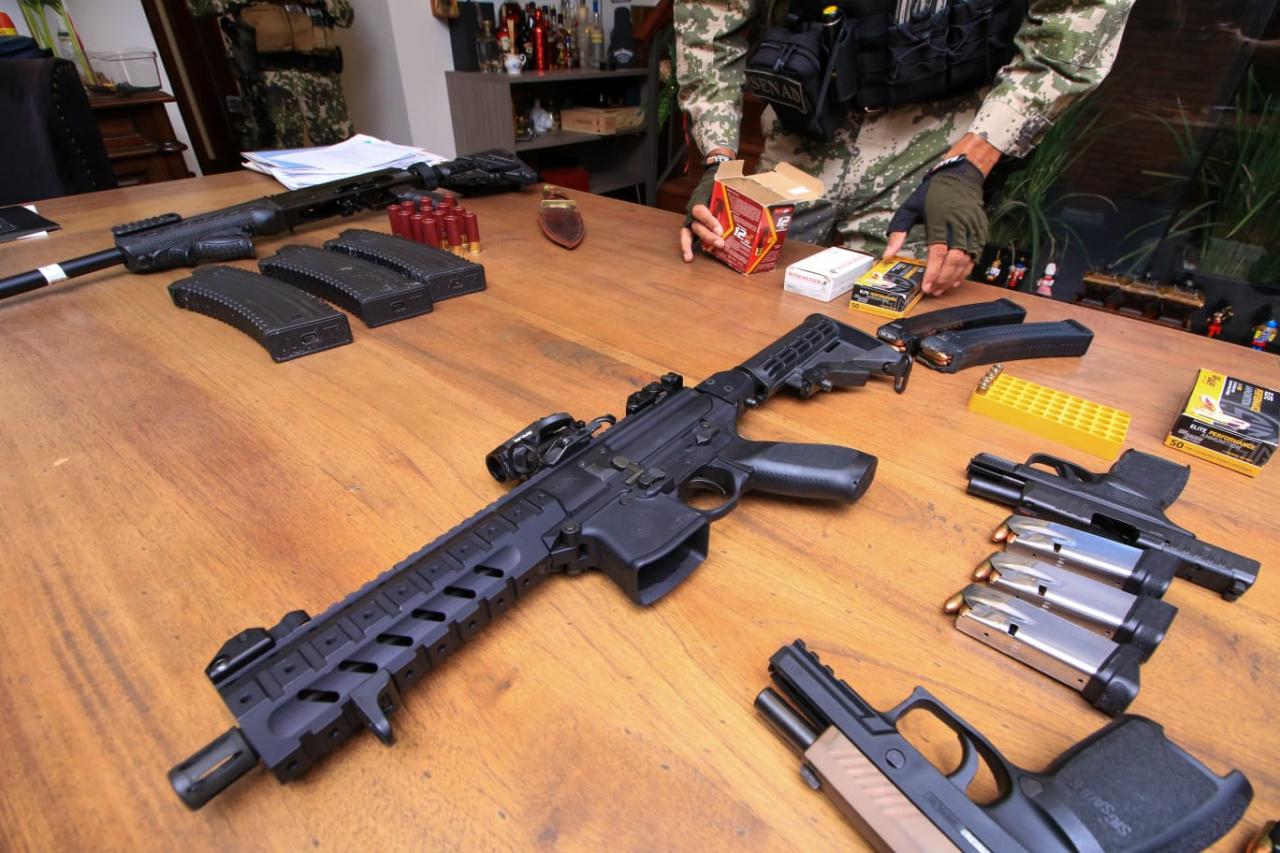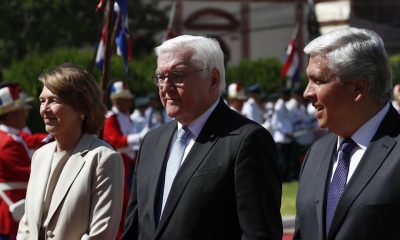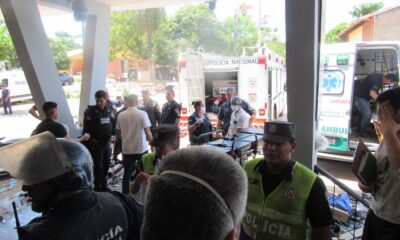International
Paraguayan Prosecutor’s Office charges military for arms trafficking

December 7 |
Paraguay’s Public Prosecutor’s Office on Wednesday indicted high-ranking military officers as part of an international arms trafficking network, impacted by the so-called Dakobo operation.
“Jorge Antonio Orue Roa was indicted for influence peddling, while Colonel Bienvenido Santiago Fretes González was indicted for aggravated passive bribery and criminal association, and General Arturo Javier González Ocampo was indicted for influence peddling and criminal association,” the report of the Attorney General’s Office said.
Likewise, the detainees María Mercedes Ocampos, Eliane Marengo, Manuel Antonio Gómez, Arnaldo Cubas, Ángel Flecha, Aldo Cantero, Ricardo Morra, Julio Cubas, Josefina Cuevas and Cinthia Turro have been requested for extradition to Brazil.
The Public Prosecutor’s Office specified that the accused are part of an international network that trafficked arms and ammunition from Europe to South America, and the operation resulted in six arrests in synchronized inspections carried out in the Central and Alto Paraná departments (central-eastern region).
The accused remain at the disposal of the judge of Guarantees, Lici Sánchez, and another 10 await extradition to Brazil, whose Federal Police opened the criminal process.
The defendants face charges of illicit arms trafficking, related punishable acts of the Weapons Law (attempt, complicity, organization, direction, aiding, abetting, facilitating, financing, advising), alteration of data, criminal association and false denunciation.
As part of Operation Dakovo, authorities from Paraguay, Brazil and the United States deployed synchronized searches on December 5 to break up one of the most significant international arms trafficking schemes in the region.
The information showed that the Argentine Diego Dirisio and his wife, Julieta Nardi, were the leaders of the trafficking scheme from the company Internacional Auto Suply, based in Asunción, capital of Paraguay, and imported a multitude of weapons and ammunition from manufacturers in Croatia, Turkey, Czech Republic and Slovenia.
International
U.S. Senate Rejects Budget, Bringing Government Closer to Shutdown Amid DHS Dispute

The U.S. Senate voted on Thursday against a budget proposal in a move aimed at pressuring changes at the Department of Homeland Security (DHS), following the killing of two civilians during a deployment of immigration agents in Minneapolis.
All Senate Democrats and seven Republican lawmakers voted against the bill, which requires 60 votes to advance, pushing the country closer to a partial government shutdown that would cut funding for several agencies, including the Pentagon and the Department of Health.
The rejection came as Senate leaders and the White House continue negotiations on a separate funding package for DHS that would allow reforms to the agency. Proposed measures include banning Immigration and Customs Enforcement (ICE) agents from wearing face coverings and requiring them to use body-worn cameras during operations.
The vote took place just hours after President Donald Trump said he was “close” to reaching an agreement with Democrats and did not believe the federal government would face another shutdown, following last year’s record stoppage.
“I don’t think the Democrats want a shutdown either, so we’ll work in a bipartisan way to avoid it. Hopefully, there will be no government shutdown. We’re working on that right now,” Trump said during a Cabinet meeting at the White House.
International
Trump Says Putin Agreed to One-Week Halt in Attacks on Ukraine Amid Extreme Cold

U.S. President Donald Trump said on Thursday that he secured a commitment from Russian President Vladimir Putinto halt attacks against Ukraine for one week, citing extreme weather conditions affecting the region.
“Because of the extreme cold (…) I personally asked Putin not to attack Kyiv or other cities and towns for a week. And he agreed. He was very pleasant,” Trump said during a Cabinet meeting broadcast by the White House.
Trump acknowledged that several advisers had questioned the decision to make the call.
“A lot of people told me not to waste the call because they wouldn’t agree. And he accepted. And we’re very happy they did, because they don’t need missiles hitting their towns and cities,” the president said.
According to Trump, Ukrainian authorities reacted with surprise to the announcement but welcomed the possibility of a temporary ceasefire.
“It’s extraordinarily cold, record cold (…) They say they’ve never experienced cold like this,” he added.
Ukrainian President Volodymyr Zelensky later commented on the announcement, expressing hope that the agreement would be honored.
International
Storm Kristin Kills Five in Portugal, Leaves Nearly 500,000 Without Power

Storm Kristin, which battered Portugal with heavy rain and strong winds early Wednesday, has left at least five people dead, while nearly half a million residents remained without electricity as of Thursday, according to updated figures from authorities.
The revised death toll was confirmed to AFP by a spokesperson for the National Emergency and Civil Protection Authority (ANPEC). On Wednesday, the agency had reported four fatalities.
Meanwhile, E-Redes, the country’s electricity distribution network operator, said that around 450,000 customers were still without power, particularly in central Portugal.
Emergency services responded to approximately 1,500 incidents between midnight and 8:00 a.m. local time on Wednesday, as the storm caused widespread disruptions.
The Portuguese government described Kristin as an “extreme weather event” that inflicted significant damage across several regions of the country. At the height of the storm, as many as 850,000 households and institutions lost electricity during the early hours of Wednesday.
Several municipalities ordered the closure of schools, many of which remained shut on Thursday due to ongoing adverse conditions.
Ricardo Costa, regional deputy commander of the Leiria Fire Brigade, said residents continue to seek assistance as rainfall persists.
“Even though the rain is not extremely intense, it is causing extensive damage to homes,” he noted.
In Figueira da Foz, a coastal city in central Portugal, strong winds toppled a giant Ferris wheel, underscoring the severity of the storm.
-

 International4 days ago
International4 days agoU.S. Senate Rejects Budget, Bringing Government Closer to Shutdown Amid DHS Dispute
-

 Central America3 days ago
Central America3 days agoPanama Supreme Court Strikes Down Panama Ports Concession as Unconstitutional
-

 International4 days ago
International4 days agoStorm Kristin Kills Five in Portugal, Leaves Nearly 500,000 Without Power
-

 Central America3 days ago
Central America3 days agoU.S. and Guatemala Sign Trade Deal Granting Zero Tariffs to Most Exports
-

 International4 days ago
International4 days agoMan Arrested After Vehicle Crashes Into Jewish Institution in Brooklyn
-

 International4 days ago
International4 days agoTrump Says Putin Agreed to One-Week Halt in Attacks on Ukraine Amid Extreme Cold
-

 Central America1 day ago
Central America1 day agoCosta Rica Goes to the Polls as Voters Choose Continuity or Change






























